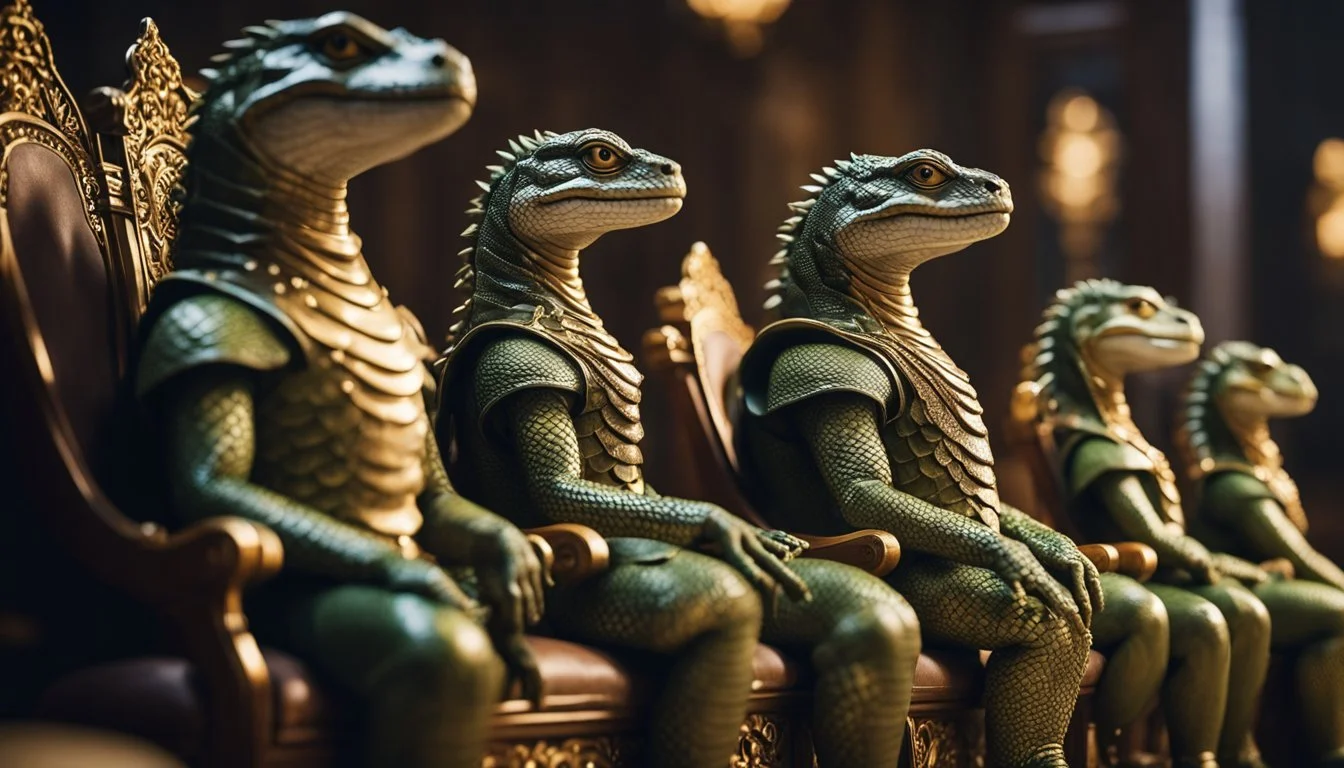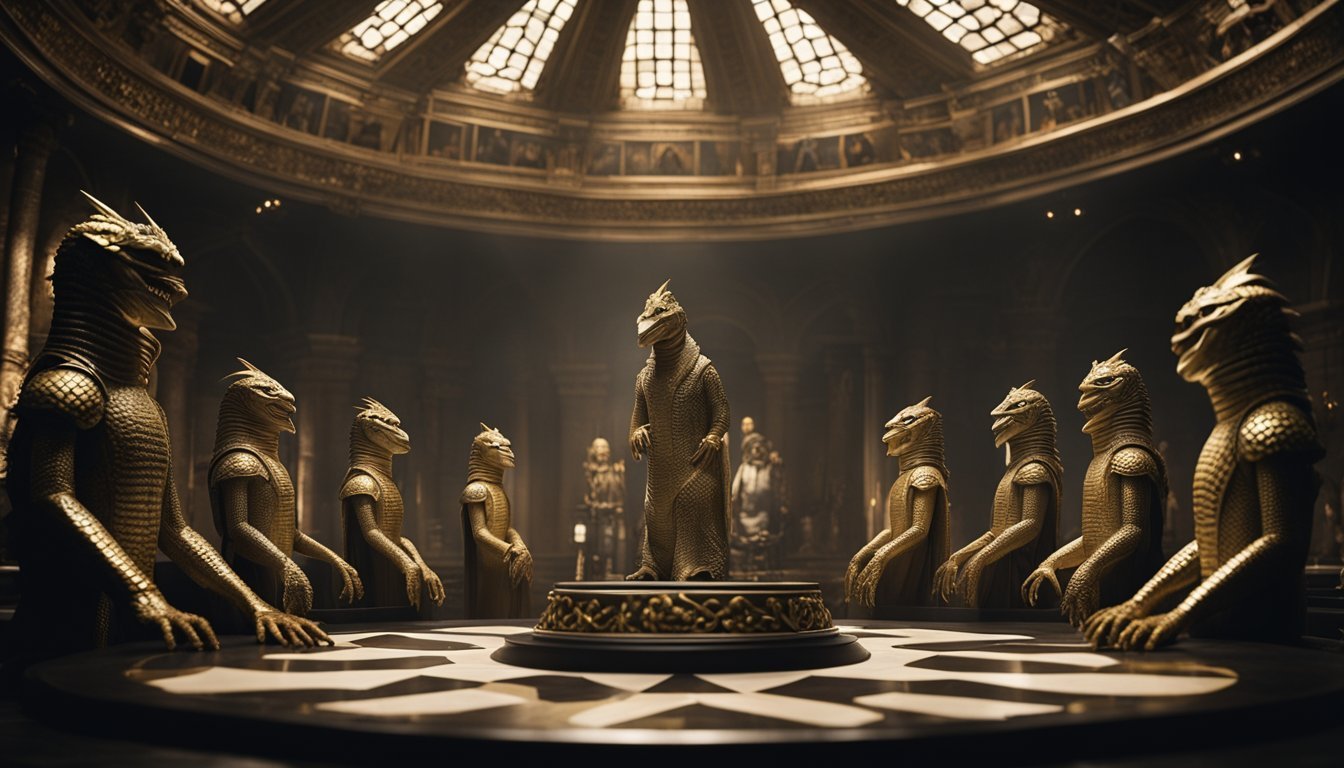Scales of Power: Shedding Light on the Reptilian Elite Conspiracy
Conspiracy theories about reptilian elites secretly controlling governments have gained traction in certain circles. These ideas claim powerful figures are actually shape-shifting lizard people in disguise. There is no credible evidence to support the existence of reptilian humanoids or their alleged infiltration of positions of power.
The reptilian elite concept was popularized by David Icke, who wrote extensively on the topic. He asserts that many world leaders are actually cold-blooded reptilians masquerading as humans. This theory has spread online, with some polls suggesting millions believe reptilians hold positions in government.
While these claims may seem fantastical, they reflect deeper social anxieties about power and control. Conspiracy theories often emerge as attempts to explain complex realities through simplified narratives. The reptilian elite idea persists despite a total lack of proof, highlighting how some find comfort in alternative worldviews, regardless of their basis in fact.
Origins of the Reptilian Elite Theory
The Reptilian Elite theory emerged in the late 20th century, claiming that shape-shifting reptilian aliens control world governments. This concept drew from various historical and cultural references to reptilian beings, but gained widespread attention through the works of a specific author.
Influence of David Icke
David Icke, a British writer and public speaker, popularized the Reptilian Elite theory in the 1990s. His book "The Biggest Secret," published in 1999, introduced the idea of reptilian aliens controlling Earth. Icke claimed these beings originated from the constellation Draco and had infiltrated human society.
He asserted that many world leaders and influential figures were actually shape-shifting reptilians in disguise. Icke's writings and lectures spread the theory globally, attracting a following of believers who saw it as an explanation for corruption and inequality in society.
Historical References to Reptilian Beings
The concept of reptilian beings has roots in various cultures and mythologies. Ancient Mesopotamian texts mentioned serpent gods, while some Native American traditions included stories of reptilian creatures.
In modern times, science fiction and UFO subcultures have featured reptilian aliens. These historical and cultural references provided a foundation for the Reptilian Elite theory to build upon.
Some proponents of the theory point to ancient artworks and texts as evidence of reptilian influence throughout history. However, scholars generally interpret these references as symbolic or metaphorical rather than literal accounts of reptilian beings.
The Reptilian Hypothesis in Modern Culture
The reptilian hypothesis has permeated various aspects of contemporary society, from entertainment media to political discourse. This fringe theory has found its way into popular culture and conspiracy circles, often targeting public figures.
Pop Culture and the Media
Hollywood has embraced the reptilian concept in numerous films and TV shows. Movies like "They Live" and "V" depict alien reptilians disguised as humans. Some conspiracy theorists claim certain celebrities are reptilian shape-shifters.
Music videos and album artwork occasionally incorporate reptilian imagery. This has led to speculation about artists' involvement with supposed reptilian bloodlines or secret societies.
Video games and novels have also explored the reptilian theme. These fictional portrayals blur the lines between entertainment and conspiracy theory for some audiences.
Politicians and the Accusation of Reptilian Identity
High-profile politicians are frequent targets of reptilian accusations. Conspiracy theorists have claimed figures like Obama, Biden, and Trump are reptilian humanoids in disguise.
These accusations often focus on physical characteristics like eye color changes or skin appearance. Videos purporting to show politicians shape-shifting circulate online, though experts debunk them as video artifacts or editing tricks.
Some theorists link political dynasties to alleged reptilian bloodlines. They claim certain families maintain power through their supposed reptilian heritage.
These unfounded claims can impact public perception of leaders and institutions. However, no credible evidence supports the existence of reptilian humanoids in positions of power.
Psychological and Societal Impact
Belief in reptilian elites has significant psychological and social implications. It shapes worldviews, influences behavior, and reflects broader societal trends.
Public Belief and Polling Data
A 2013 Public Policy Polling survey found that 4% of American voters believed in the existence of "lizard people" controlling society. This figure, while seemingly small, represents millions of individuals. Demographic breakdowns revealed variations across age groups, political affiliations, and education levels.
Belief in reptilian elites often correlates with acceptance of other conspiracy theories. Those who endorse this idea are more likely to believe in the Illuminati, secret government control, and hidden power structures. This clustering of beliefs suggests a broader pattern of conspiracy thinking.
Some researchers argue that belief in reptilian elites serves as a coping mechanism for uncertainty and powerlessness. It provides a simple explanation for complex global events and power dynamics.
Conspiracy Theory as a Social Phenomenon
The reptilian elite theory exemplifies how conspiracy beliefs spread and persist in society. Online communities and social media platforms play a crucial role in disseminating and reinforcing these ideas. Echo chambers form, where believers share "evidence" and validate each other's views.
Journalist Philip Bump notes that conspiracy theories often flourish during times of social upheaval or rapid change. The reptilian elite concept gained traction in the late 20th century, coinciding with accelerating globalization and technological advances.
Belief in reptilian elites can impact real-world behaviors. Some adherents may distrust government institutions, mainstream media, or scientific authorities. This skepticism can influence voting patterns, healthcare decisions, and engagement with public policies.
Scientific Examination
Rigorous scientific analysis has consistently found no evidence to support claims of reptilian elites. Critical examination of these theories reveals fundamental flaws in reasoning and methodology.
Debunking Pseudoscience
Scientific scrutiny exposes the lack of credible evidence for reptilian elite claims. Experts point out that alleged physical signs like color-changing eyes are easily explained by normal human variations. Claims of reptilian facial features in photos or videos stem from image artifacts or selective interpretation.
Genetic analysis confirms humans share no DNA with reptiles beyond distant evolutionary connections. The human genome has been thoroughly mapped, with no signs of reptilian genes or alien tampering.
Credible Evidence and Lack Thereof
Reputable scientific institutions have found zero credible evidence supporting reptilian elite theories. NASA, leading universities, and independent researchers have all reached the same conclusion - these claims are baseless.
PolitiFact and other fact-checkers rate reptilian conspiracy theories as "Pants on Fire" false. They note proponents rely on misinterpreted data, false assumptions, and circular logic rather than verifiable facts.
ESP and other paranormal claims associated with reptilian theories also lack scientific support. Controlled studies show no evidence of psychic abilities or supernatural phenomena linked to alleged reptilians.
Reptilian Theory and Public Figures
The reptilian elite conspiracy theory has targeted numerous high-profile politicians and public figures. Proponents claim certain leaders are actually shape-shifting reptilian aliens in disguise, controlling world events from positions of power.
Alleged Reptilian Figures
President Joe Biden, Barack Obama, and members of the British royal family have all been accused of being reptilians. Queen Elizabeth II was a frequent target of such claims during her reign. Conspiracy theorists point to supposed physical "signs" like eye changes or odd skin patterns as evidence. George W. Bush and Bill Clinton are also named in reptilian theories. Proponents argue these leaders exhibit superhuman abilities or display "cold-blooded" behavior as proof of their reptilian nature.
Political Implications and Accusations
The reptilian elite theory often intersects with other conspiracy narratives about shadowy groups controlling world governments. Believers claim reptilians manipulate elections, start wars, and shape economic policies for their own benefit. Some accuse reptilians of using mind control on the public through media and technology. These ideas can fuel distrust in democratic institutions and elected officials. Critics argue the reptilian theory is used to demonize political opponents and spread misinformation online.
Impact on Public Policy and Governance
Conspiracy theories about reptilian elites have seeped into political discourse, affecting policy discussions and government operations. These beliefs have influenced some voters' perceptions and decision-making processes, leading to unexpected challenges for public officials and institutions.
Policy Making and Conspiracy Theorists
Some politicians have capitalized on reptilian elite conspiracy theories to gain support. This has led to the introduction of unusual legislative proposals in local and state governments. For example, a few city council members have suggested allocating funds to "reptile detection" measures in government buildings.
These ideas rarely progress far, but they divert time and resources from legitimate policy concerns. Public hearings occasionally feature citizens expressing fears about reptilian infiltration, forcing officials to address these claims instead of focusing on pressing community issues.
National Security and Conspiracy Theories
The U.S. government has faced unique challenges related to reptilian elite conspiracy theories in national security contexts. Some individuals with security clearances have been flagged for expressing belief in reptilian overlords, raising concerns about their judgment and reliability.
Intelligence agencies have had to develop protocols for addressing these beliefs during background checks and security assessments. The Department of Defense has even issued internal memos advising personnel on how to respond to reptilian-related inquiries from the public.
These theories have also impacted diplomatic relations. Foreign leaders have occasionally been accused of being reptilians, complicating international negotiations and policy discussions.
Technology and the Spread of Misinformation
The digital age has transformed how information circulates, with online platforms becoming key conduits for both facts and falsehoods. Social media and search engines play pivotal roles in disseminating content, while efforts to combat misinformation face significant challenges.
Social Media's Role
Facebook, Instagram, and other social platforms have become breeding grounds for conspiracy theories. These sites' algorithms often prioritize engaging content, inadvertently promoting sensational claims. Fake news spreads rapidly through shares and likes, reaching millions within hours.
The CIA has noted the impact of social media on information warfare. Meta (formerly Facebook) has implemented fact-checking measures, but critics argue these efforts are insufficient. Archived posts show how quickly false narratives can take root and persist online.
Combatting Misinformation Online
Tech companies are developing AI-powered tools to detect and flag misinformation. Fact-checking organizations partner with platforms to verify viral content. Some sites now label posts containing disputed claims.
Digital literacy programs aim to educate users on identifying reliable sources. Many platforms have adjusted their algorithms to reduce the visibility of known false information. However, these efforts face challenges, as determined spreaders of misinformation adapt their tactics.
Experts stress the importance of critical thinking skills in navigating the digital landscape. Users are encouraged to verify information across multiple reputable sources before sharing.
Health and Well-Being in the Context of Conspiracy Theories
Conspiracy theories about health and medicine can have significant impacts on public well-being and individual mental health. These beliefs often target major pharmaceutical companies and health organizations.
Vaccine Conspiracies and Public Health
Pfizer, a leading pharmaceutical company, has been at the center of vaccine-related conspiracy theories. Some claim that Pfizer's CEO, Albert Bourla, has ulterior motives behind the COVID-19 vaccine rollout.
These theories have led to vaccine hesitancy in some communities, potentially hampering public health efforts. Health officials stress that vaccines, including COVID-19 shots, undergo rigorous testing for safety and efficacy.
Conspiracy beliefs about vaccines can spread rapidly on social media platforms. This misinformation may contribute to lower vaccination rates and increased risk of disease outbreaks in certain areas.
Emotional and Mental Implications
Belief in health-related conspiracy theories can impact mental well-being. Individuals who subscribe to these ideas may experience increased anxiety and distrust of medical professionals.
Some people find comfort in conspiracy theories during uncertain times. However, this can lead to isolation from mainstream sources of information and support.
Mental health experts note that excessive focus on conspiracy theories may strain relationships. It can create conflicts with family and friends who don't share the same beliefs.
Seeking reliable, scientific information from reputable sources is crucial for maintaining emotional balance. Mental health professionals can provide support for those struggling with conspiracy-related anxiety.
Reptilian Elite Theory Critique
The reptilian elite theory lacks scientific basis and relies on flawed reasoning. Critical examination reveals major issues with the claims and arguments put forth by proponents.
Rational Arguments Against the Theory
No credible evidence supports the existence of reptilian aliens disguised as humans. Biological differences between reptiles and mammals make such a transformation implausible. DNA testing and medical imaging would easily expose any non-human entities.
High-profile figures accused of being reptilians appear fully human in countless interactions and medical exams. Their family histories and genetic lineages can be traced. Claims of shape-shifting abilities defy known laws of physics and biology.
The theory ignores simpler explanations for political behaviors and decision-making. Complex geopolitical factors and human psychology better account for government actions than a secret reptilian agenda.
Logical Fallacies and Argumentative Errors
The reptilian elite theory relies heavily on circular reasoning. It asserts reptilians exist, then interprets any unusual behavior as evidence of reptilian nature. This creates an unfalsifiable claim immune to disproof.
Proponents engage in cherry-picking, focusing on a few odd characteristics while ignoring overwhelming contrary evidence. They employ confirmation bias, seeing reptilian traits in mundane human features like eye color changes.
The theory uses the ad hominem fallacy to dismiss critics as part of the conspiracy. It commits the burden of proof fallacy by demanding others disprove reptilians rather than providing solid evidence for the claim.
Occam's Razor suggests accepting the simpler explanation of human politicians over elaborate alien conspiracies. The theory fails to meet basic standards of logic and evidence.








